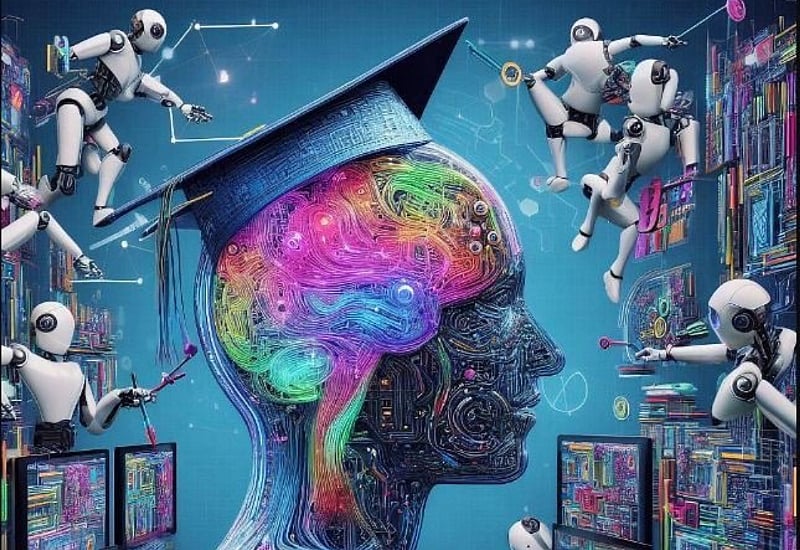The future, they say, is unknown—but how true is that statement in today’s rapidly advancing technological world? With the speed of innovation and the signs of the times, it is possible to predict what lies ahead, especially in the field of technology and artificial intelligence (AI), and how it may impact the lives of graduates—guided also by faith and the help of the Holy Spirit.
Technology refers to the application of scientific knowledge for practical purposes. It spans a wide range of tools and techniques, including AI. Artificial Intelligence, in particular, focuses on creating machines that can think, make decisions, and operate autonomously. In simple terms, AI is a specific type of technology. From this understanding, it’s clear that AI is here to stay.
Now, the big question is: what is the future for students currently in school and those about to graduate? To prepare for a future dominated by AI and other technologies, it is necessary for students to be equipped with the right skills and knowledge to use them effectively. Should graduates adjust to AI and technological changes, or should they passively allow the future to decide their fate?
The danger is that if students are not taught how to use AI and other technologies, they may end up unemployed or irrelevant in the job market. It is therefore essential that we integrate AI and technology into our educational curriculum. This will ensure students are prepared for the challenges and opportunities of the future.
Companies already replacing workers with AI
According to Tech.com, several companies have already replaced or are in the process of replacing workers with AI:
1. MSN: In 2020, MSN sacked dozens of journalists and began using AI software to write news articles displayed on its homepage. This decision, according to PA Media, was due to financial difficulties—not the pandemic.
2. Google: In 2024, Google announced two rounds of layoffs, mostly in its ad division. While the company didn’t directly blame AI, the timing coincided with a major push to use AI in customer care and sales.
3. IKEA: The Swedish furniture giant announced in June 2023 that it would use an AI bot, Billie, to handle customer queries. However, it is retraining affected call center workers to become interior design advisors.
4. BlueFocus: The Chinese marketing firm terminated contracts with its content writers and designers after acquiring an AI service license. This coincided with its partnership to build a full-scale AI-powered marketing system.
5. Salesforce: In 2024, the software company cut 700 jobs. While not directly linking the layoffs to AI, the company has significantly increased its investment in AI.
6. Duolingo: In January 2024, the language app offboarded 10% of its contractors, partly due to its transition to AI-powered content translation.
7. Best Buy: After a series of layoffs in 2023, Best Buy announced an AI partnership with Google Cloud and Accenture, indicating a move toward AI-powered customer experience solutions.
Companies planning to replace workers with AI
Some companies are planning to replace workers in the near future:
• Department of Government Efficiency (DOGE): Spearheaded by Elon Musk, DOGE has reportedly used AI to identify federal job cuts. There are also suggestions of an in-house AI chatbot in development.
• IBM: IBM plans to replace about 30% of its back-office roles—roughly 7,800 jobs—with AI over the next five years. Hiring has already slowed in HR and clerical roles.
• BT: British telecom giant BT aims to cut 55,000 jobs by 2030, with 10,000 to be replaced by AI. The company says AI will help streamline customer service while retaining some human roles.
Challenges in embracing AI and technology
One of the major challenges of embracing AI is job displacement. Many repetitive or routine jobs are likely to be automated, creating a skills gap. Graduates must develop critical thinking, creativity, and problem-solving abilities to remain relevant.
Another challenge is the need for continuous learning. As technology evolves, graduates must constantly update their skills to keep up with changes and stay competitive in the job market.
Opportunities with AI and technology
Despite the challenges, there are also opportunities:
• New careers: AI and technology will create job opportunities in fields like data science, cybersecurity, and AI development.
• Increased efficiency: AI can automate routine tasks, allowing graduates to focus on more creative and strategic work.
• Remote work: Technology enables flexible work arrangements, improving work-life balance and productivity.
Skills graduates must develop
To thrive in a tech-driven future, graduates must acquire key skills, including:
• Digital literacy: Proficiency in using digital tools and technologies is essential.
• Data analysis: The ability to collect, interpret, and make decisions based on data will be highly valuable.
• Creativity and innovation: Thinking outside the box to solve complex problems is a must.
• Collaboration and communication: Graduates must work well with others and clearly communicate complex ideas.
Looking at the challenges, opportunities, and essential skills, students and graduates must shift their perspective about the future of AI and technology. It is not, as some religious leaders claim, the anti-Christ, but rather a tool that can be used for the benefit of society—if approached wisely.
To succeed in 2030 and beyond, graduates must embrace lifelong learning and stay adaptable. With the right mindset and preparation, they can thrive in an AI-powered world.


